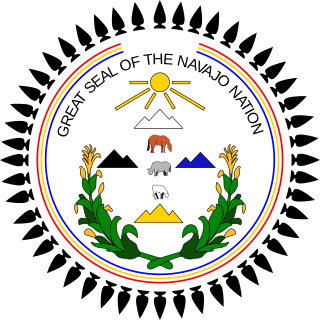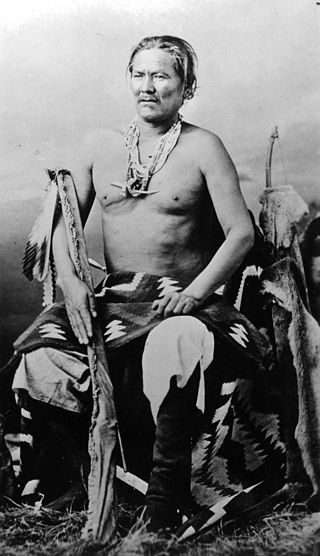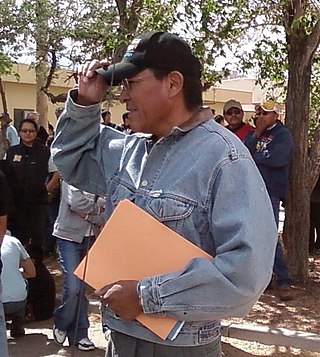
Aneth is a census-designated place (CDP) in San Juan County, Utah, United States. The population was 598 at the 2000 census. The origin of the name Aneth is obscure.

Montezuma Creek is a census-designated place (CDP) in San Juan County, Utah, United States. The population was 335 at the 2010 census, a decrease from the 2000 figure of 507.

The Four Corners is a region of the Southwestern United States consisting of the southwestern corner of Colorado, southeastern corner of Utah, northeastern corner of Arizona, and northwestern corner of New Mexico. Most of the Four Corners region belongs to semi-autonomous Native American nations, the largest of which is the Navajo Nation, followed by Hopi, Ute, and Zuni tribal reserves and nations. The Four Corners region is part of a larger region known as the Colorado Plateau and is mostly rural, rugged, and arid.

The Navajo Nation Council is the Legislative Branch of the Navajo Nation government. The council meets four times per year, with additional special sessions, at the Navajo Nation Council Chamber, which is in Window Rock, Arizona.

The Navajo are a Native American people of the Southwestern United States.

The Fallen Man is the twelfth crime fiction novel in the Joe Leaphorn / Jim Chee Navajo Tribal Police series by Tony Hillerman, first published in 1996.

The Ramah Navajo Indian Reservation is a non-contiguous section of the Navajo Nation lying in parts of west-central Cibola and southern McKinley counties in New Mexico, United States, just east and southeast of the Zuni Indian Reservation. It has a land area of 230.675 sq mi (597.445 km²), over 95 percent of which is designated as off-reservation trust land. According to the 2000 census, the resident population is 2,167 persons. The Ramah Reservation's land area is less than one percent of the Navajo Nation's total area.

Kenneth Maryboy is an American politician for San Juan County, Utah, and was Navajo Nation Council Delegate. Kenneth is a former San Juan County Commissioner. Maryboy was the third Democrat in a row to have been elected to the Commissioner District 3 position since its inception in 1984 that divided the county into three districts. Kenneth was replaced on the commission in 2015 by Rebecca M. Benally

Mark Maryboy is a retired American politician for San Juan County, Utah, and a former Navajo Nation Council Delegate for the Utah Navajo Section of the Navajo Tribe. He is the brother of Kenneth Maryboy who currently serves as the Navejo Nation Council Delegate, in the positions he once stood. Mark is of the Navajo Indian Tribe.

U.S. Route 160 (US 160), also known as the Navajo Trail, is a U.S. Highway which travels west to east across the Navajo Nation and Northeast Arizona for 159.35 miles (256.45 km). US 160 begins at a junction with US 89 north of Cameron and exits the state into New Mexico south of the Four Corners Monument. Along its journey, the route connects the communities of Tuba City, Moenkopi, Rare Metals, Tonalea, Tsegi, Kayenta, Dennehotso, Mexican Water, Red Mesa, and Teec Nos Pos.
Lawrence T. Morgan is the former Speaker of the Navajo Nation Tribal Council.

Ben Shelly was the 7th president of the Navajo Nation. He was the first president to have been elected both president and vice president of the Navajo Nation, as well as the first New Mexican Navajo to hold the Navajo presidency.

The Bureau of Indian Education (BIE), headquartered in the Main Interior Building in Washington, D.C., and formerly known as the Office of Indian Education Programs (OIEP), is a division of the U.S. Department of the Interior under the Assistant Secretary for Indian Affairs. It is responsible for the line direction and management of all BIE education functions, including the formation of policies and procedures, the supervision of all program activities, and the approval of the expenditure of funds appropriated for BIE education functions.
The bill to amend the Act of March 1, 1933, to transfer certain authority and resources to the Utah Dineh Corporation., and for other purposes. This bill was introduced on the Senate floor by Rep. Robert Bennett (R-UT) on 21 September 2009. It was referred to the Committee on Indian Affairs. On December 9, 2009 Senate Committee on Indian Affairs held hearing 111-538. No further action was taken by the Committee.
The Utah Dineh Corporation is a nonprofit organization which was established in order to maintain the Utah Navajo Oil Reserve revenues in the Aneth Oil Field section of Utah. Much of this area is within the Utah Navajo side of San Juan County, Utah.

Bears Ears National Monument is a United States national monument located in San Juan County in southeastern Utah, established by President Barack Obama by presidential proclamation on December 28, 2016. The monument protects 1,351,849 acres of public land surrounding the Bears Ears—a pair of buttes—and the Indian Creek corridor rock climbing area. The Native American names for the buttes have the same meaning in each of the languages represented in the region. The names are listed in the presidential proclamation as "Hoon’Naqvut, Shash Jáa [sic], Kwiyaghatʉ Nükavachi/Kwiyagatu Nukavachi, Ansh An Lashokdiwe"—all four mean "Bears Ears".

A Chapter is the most local form of government on the Navajo Nation. The Nation is broken into five agencies. Each agency contains chapters; currently there are 110 local chapters, each with their own chapter house. Chapters are semi-self autonomous, being able to decide most matters which concern their own chapter. Typically, they meet in a Chapter house, where they can also express their opinions to their Navajo Nation Council Delegate, although those opinions are non-binding. As of January 2004, there were a total of 110 such meeting places in existence. Currently there are 24 delegates who represent the 110 chapters. The number of delegates was reduced from 88 in the 2010 election.
The 2015 Navajo Nation Presidential Election was held on April 21, 2015, with the primary on August 26, 2014. Joe Shirley Jr. and Chris Deschene advanced to the general.



















